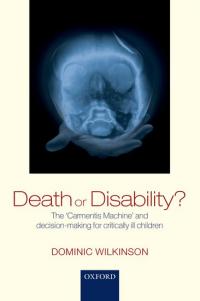Disability
Several key debates in practical ethics revolve around disability. Is it permissible for prospective parents to use reproductive technology to screen against disabilities such as Down’s syndrome or even deafness, or is it just a form of dangerous eugenics? Don’t such parental choices express a repugnant negative statement about the value of disabled people and their lives? On the other hand, there are disabled couples who want to use reproductive technology to create children who are deaf like them. Would that be wrong? How could it be wrong if the resulting child wouldn’t have even existed otherwise?
Another set of important questions revolve around justice, prejudice, and normality. On the widespread ‘medical model’ of disability, we should think of disability as akin to disease: it is a deviation from biological normality that needs to be cured or corrected. But is there anything inherently bad about deviating from the biologically normal? Why is normality important? According to the opposing ‘social model’, defended by many disability activists, disability is no more than the product of social prejudice against the different and atypical. But even if pernicious prejudice against disabled people is still pervasive, is it really the only reason for the difficulties faces by many disabled people?
Research outputs and media
Book
 |
Death or Disability?Wilkinson, D., (2013), 'Death or Disability? The 'Carmentis Machine' and decision-making for critically ill children'. (Oxford, Oxford University Press) In ancient Rome parents would consult the priestess Carmentis shortly after birth to obtain prophecies of the future of their newborn infant. Today, parents and doctors of critically ill children consult a different oracle. Neuroimaging provides a vision of the child's future, particularly of the nature and severity of any disability. Based on the results of brain scans and other tests doctors and parents face heart-breaking decisions about whether or not to continue intensive treatment or to allow the child to die. Paediatrician and ethicist Dominic Wilkinson looks at the profound and contentious ethical issues facing those who work in intensive care caring for critically ill children and infants. When should infants or children be allowed to die? How accurate are predictions of future quality of life? How much say should parents have in these decisions? How should they deal with uncertainty about the future? He combines philosophy, medicine and science to shed light on current and future dilemmas. Visit OUP webpage for more information | ISBN: 9780198799054 |
Open Access journal articles
Brick, C., Kahane, G., Wilkinson, D., Caviola, L. and Savulescu, J., (2020), 'Worth living or worth dying? The views of the general public about allowing disabled children to die', Journal of Medical Ethics, Vol: 46(1) [PMC6984061]
Wilkinson, D. and Savulescu, J., (2014), 'Disability, discrimination and death: is it justified to ration life saving treatment for disabled newborn infants?', Monash Bioethics Review., Vol: 32(1-2): 43-62. [PMC4210721]
Kahane, G. and Savulescu, J., (2012), 'The Concept of Harm and the Significance of Normality', Journal of Applied Philosophy, Vol: 29(4): 318-332. [PMC3617520]
Wilkinson, D., (2011), 'A Life Worth Giving? The Threshold for Permissible Withdrawal of Life Support From Disabled Newborn Infants', The American Journal of Bioethics, Vol: 11(2). [PMC3082774]
Kahane, G. and Savulescu, J., (2011), 'Disability: A Welfarist Approach', Clinical Ethics, Vol: 6(1): 45-51. [PMC3227811]
Levy, N., (2015), 'Body Integrity Identity Disorder: the condition where sufferers want to be disabled', The Independent (5 October).
Savulescu, J., (2014), 'Risk of Future disability to Child Should Weigh Heavily in Birthplace Decisions', MedicalXpress (22 January).




